When Misery is Profitable
Why is it that so much of modern life, frankly, sucks? Sure, we have a few fun gadgets and some booze (and in some places, legal marijuana) to distract us and ease the weltschmerz, but why does it so often seem that this is the natural, unavoidable state of things? Can we hope for better? Life isn’t always easy or fun, and learning that is part of growing up. However, there really is more pain than there absolutely has to be, and that’s because misery is profitable.









